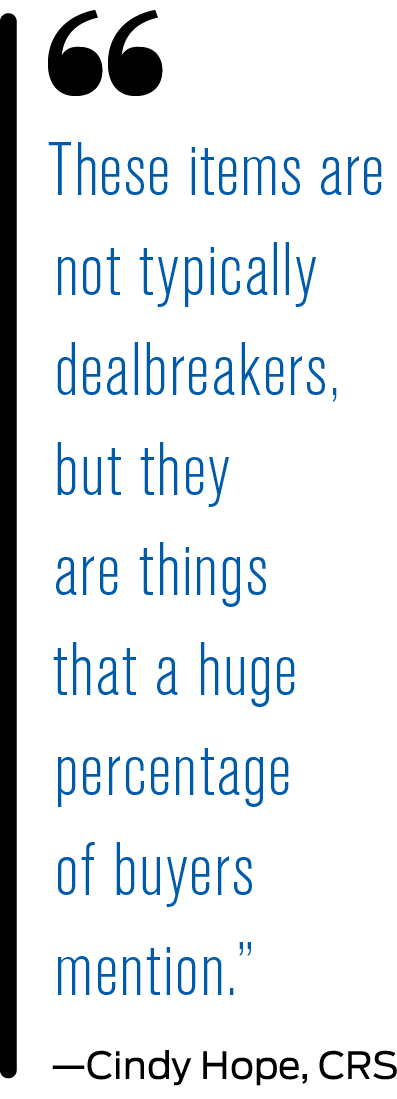Due to spending more time at home, buyers are looking for new technology features in properties they’re considering purchasing
By Andrew Conner
 As spending more time at home becomes increasingly common for people across the country, the need for newer technology in homes increases.
As spending more time at home becomes increasingly common for people across the country, the need for newer technology in homes increases.
From ultraviolet closets made to disinfect clothes to biometric fingerprint scanning for keyless entry, the future of residential home technology is now. While these extremely high-tech additions might only be an option for the wealthiest buyers, buyers from all walks of life are seeing technology as important, if not necessary.
“The No. 1 technology that buyers are interested in is infrastructure,” says Brian Copeland, CRS, broker and founder of Doorbell Real Estate in Nashville, Tennessee. “It goes well beyond the walls of the home. We have buyers in rural areas and in urban areas, and they’re concerned about the same thing: what tech infrastructure will give them the internet speed and convenience they need.”
A strong connection
With remote work being a norm for many professionals, fast, dependable internet is more than a “nice-to-have”—it’s a requirement. “Buyers are looking for things like Google Fiber or wondering if the cable and internet provider in the area has a commercial connection that they can offer to residential customers,” says Copeland. “It’s this kind of infrastructure that’s more important than anything else right now when it comes to tech.”
While internet provider contracts move with the seller, buyers still want to know that the functionality is available. So how can you address these needs with your clients? Make internet and phone connection part of the due diligence process.
“Internet speeds might not be part of your typical home inspection, but it is certainly a component of due diligence,” says Copeland. “I don’t think it’s out of the question for a buyer to ask a seller for a speed test to be provided to them in writing. And don’t forget about outdoor living. If your buyer listens to music in the backyard, they will want to know that the WiFi will reach the farthest end of the pool.”
In addition to WiFi strength, be sure to review the mobile phone connection with your buyer. “We’ve seen dead spots even in urban cores where it’s just one small area that doesn’t have a connection,” says Copeland. “But if the buyer is going to have to go outside every time they want to talk on their phone—even if you’re in the hottest market—it’s a no-go. You should check the mobile service in every home, access other services on your phone and even get on a phone call during the inspection period. Try staying on the line for 30 minutes, and see if the call drops. That is absolutely part of smart due diligence that we have to be doing in this marketplace.”
Attractive features
Beyond the internet infrastructure needed to live and get work done, there are some tech features that may not be necessary but which still entice buyers. For Cindy Hope, CRS, broker at Allen Tate REALTORS® in Charlotte, North Carolina, one of the most common tech features buyers are interested in is keyless entry. “It’s a convenience factor,” says Hope. “For families with children who might lock themselves out of the house while playing outside, or if you have guests who are arriving when you’re not home, there are a lot of scenarios in which it makes life easier and more convenient.”
Most keyless entry systems provide at minimum an electronic PIN pad for entering a code to unlock the door; however, the sky is the limit in terms of how high-tech you can go. They can be linked to your overall security system, whether that is a home alarm system or even internet-connected applications such as a Google Home. These more advanced systems can notify homeowners whenever the door is used, or even provide unique codes to guests who only work for a limited time.
 In addition to providing convenience, tech like keyless entry or video doorbells, such as Amazon Ring or the Nest doorbell, add a layer of security to the home. “You have a lot of people at home on Zoom calls, and they can’t get up to go to the door every time it rings,” says Hope. “With a video doorbell you can look at your phone and see who’s at your door. Or if your teenager is home alone, they can see who’s coming to the door.”
In addition to providing convenience, tech like keyless entry or video doorbells, such as Amazon Ring or the Nest doorbell, add a layer of security to the home. “You have a lot of people at home on Zoom calls, and they can’t get up to go to the door every time it rings,” says Hope. “With a video doorbell you can look at your phone and see who’s at your door. Or if your teenager is home alone, they can see who’s coming to the door.”
Although keyless entry, video doorbells and other similar tech features such as internet-connected appliances are extremely popular with buyers, it’s important to remember that many buyers may already have this technology in their current homes, or the sellers may be taking their Ring doorbell or other device with them when they leave.
“These items are not typically dealbreakers, but they are things that a huge percentage of buyers mention,” says Hope. “And, typically, even if it’s not already available in the home, it’s something they are planning on adding.”
Copeland echoes Hope’s comments. “I’m seeing people who, in the past, may have said, ‘I need an alarm system,’ but now all of those things are based on Amazon Alexa or Google Home, which they already have,” says Copeland. “In some cases, technology like prewiring for speakers is a negative because Bluetooth has replaced it. I’ve had buyers point at outlets that were wired for speakers and ask, ‘What is this?’”
What’s clear is that the interest in new technology among homebuyers is not going away. Whether it is the online infrastructure that is now all-but-necessary for the new normal of working from home, or the convenience factor of an interconnected home security system, tech remains an important concern for homebuyers.
Shining Light
The coronavirus pandemic changed many aspects of the way we live. One of the biggest trends coming out of the pandemic is making spaces—and especially residential homes—safer with regard to COVID-19 and any similar situations that could occur in the future.
One unique way some people are doing this is through the use of germicidal ultraviolet (UV) light.
This technology uses UV-C light rays to, most commonly, disinfect the air, but it can also be used for surfaces in homes. The most popular products using this technology are UV air purifiers or UV additions to an existing HVAC system, both of which clean the air you breathe by running it past a UV light. However, while still rare, there are some homeowners who have installed these types of lights in their homes to disinfect surfaces, such as a kitchen or laundry room counter, or even closets. It’s important to note that when used in the home (as opposed to in an air system), homeowners need to be careful with UV light technology because it is not safe for use on human skin.
Be sure to follow us on our social media channels @ThisIsRRC where we regularly post different technology tips!
Photo: iStock.com/Andrey Suslov








